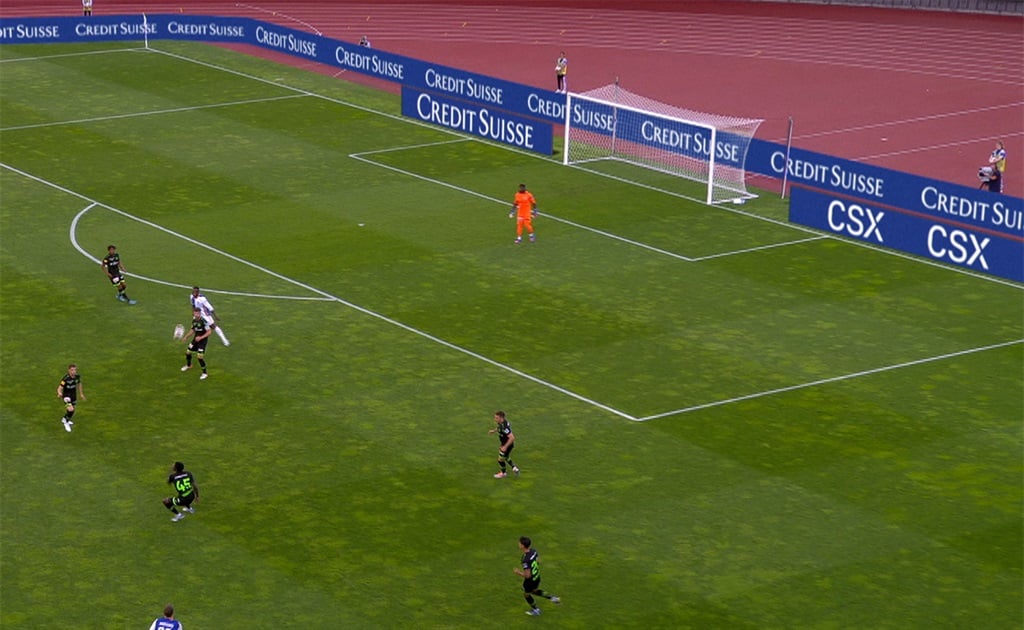
- The future of in-stadium and on-field sports TV ads is entirely virtual.
- This means the ads you see on TV during a live match may differ from what other viewers see.
- Broadcasters are generating extra revenue, and saving on paint tins, using digital projections that can change at the click of a button.
- And future ads may target you specifically, like those online.
- For more tech stories, visit the Tech and Trends homepage.
The days of large three-dimensional murals expertly painted on sports fields, and even static advertising boards surrounding tennis courts and other sporting pitches, are numbered.
In their place, are an increasing number of virtual ads superimposed onto stadiums for television viewers. Broadcasters do this using technology so slick that at-home spectators are unlikely to realise.
The impact of this technology is far-reaching for advertisers and broadcasters, particularly given busy stadium schedules. It's also useful for multi-sport facilities that may host a soccer match on a Friday and a rugby match on a Saturday, each with its own headline sponsor. But it's the revenue and targeting that are getting most tech companies in this space excited.
Soon, advertisers will likely use this technology to directly target at-home viewers with content tailored to their specific locations and profiles, much like how online advertising works today.
Tom Huston, chief commercial officer of Swiss-based uniqFEED, says the technology unlocks opportunities for brands and sponsors to take advantage of the "TV-visible space", and the potential is limited only by their creativity.
"Virtual advertising technology is already being used worldwide in football, rugby, baseball, racket sports, basketball, cricket, motorsports, winter sports and more," Huston told News24.
Empty stadiums during Covid-19 helped accelerate the technology
A basic form of this technology has actually been around for some time, and South Africa led the way in the build-up to the 2010 FIFA World Cup.
FIFA, scared of the impact painted ads would have on the stadium grass and the associated risk of annoying high-profile sponsors, instructed SuperSport that Super 14 rugby fixtures should use ads digitally superimposed on the playing surface.
It was seen as a watershed moment in how stadium advertisers can reach at-home viewers.
READ | Highly personalised and persuasive AI-generated spam may soon flood your inbox
Although Huston agrees the concept is not new, until recently, "it was limited to hardware-based solutions which were expensive and challenging to integrate into the broadcast workflow, typically requiring additional hardware installations within stadiums and extra personnel on site".
Digital advertising technology has advanced dramatically in recent years, and according to DStv's Patrick van Schoor, the empty stadiums during Covid-19 helped accelerate its innovation.
Van Schoor told News24:
Still, local application of this technology is currently more about practicality than ad revenue. It's far easier to click a button to remove an ad than respray grass and move hoardings, especially given mixed-use venues and busy schedules.
"Digital branding negates the need to paint the fields, which sponsors had to pay for and manage in the past. Historically, bad weather could wash paint off and, more importantly, it took time and effort to manage.
The new technology means the same venue can be used on the same day or over a weekend, as an example, but various sponsors could feature," says Van Schoor.
Digital advertising increasing revenue opportunities
Although a practical advancement, global tech companies see the dollar signs regarding the future of in-stadium advertising.
Gérald Olivier, head of product marketing at Belgian virtual sporting graphics company DeltaCast, says studies have shown the value of digital advertising.
"Advertising revenues are the second source of revenues after the broadcasting rights for clubs and leagues," Olivier told News24. "Studies have shown that clubs could increase their revenues by 30% by introducing digital ads. It unlocks opportunities to monetise a broadcast stream internationally by adding local sponsors."
And uniqFEED's Huston says virtual advertising enables sports rights holders to offer increased value to their commercial partners and generate more revenue from sponsorship.
"[Virtual advertising] allows the rights holders to maximise the amount of revenue that they can generate from their sponsorship inventory. Virtual advertising enables the slicing up of the global sponsorship "pie" so that the individual slices can be sold to different brands," he says.
Increased targeting of ads to at-home viewers
In essence, the benefit comes from rights holders selling the same advertising space multiple times to different sponsors who are only interested in targeting particular markets.
Huston said:
All this means that the ads you see during an English Premier League match broadcast on SuperSport may already be different from what viewers on Sky are seeing.
But DeltaCast believes the future of sports advertising looks far more targeted and granular - particularly as streaming platforms increase their sports broadcasts.
ALSO READ | 'Wild West': Republican video shows AI future in US elections
"At DeltaCast, we believe more in pre-match advertising on the pitch," says Olivier. "It's more affordable, especially for African, Asian or South American markets. And it's especially interesting for OTT streaming with the addition of specific ads to targeted audience."
This, in theory, means that fans watching the exact same match, at the same time, may see different advertisements based on a specific profile generated by marketing companies, much like online advertisers currently achieve.
Software and AI-based solutions
Although the tech has been around for some time, its recent acceleration has been impressive. Solutions are now entirely software-based and use artificial intelligence and computer vision.
"This makes the technology less complex, typically less expensive, and has enabled a more widespread adoption around the world," says Huston.
"Software-only solutions also offer content overlay or 'erase and replace', which means that existing advertising within the venue can be replaced with digital content within the broadcast feed."
Although SuperSport told News24 this technology wouldn't necessarily change the live sports experience for local viewers, uniqFEED sees potential for increased advertising revenue in the African market.
"There is huge potential for the technology to add real value for sports properties in Africa, particularly in football, rugby and cricket," Huston says.
Any sport which has a global audience can benefit hugely from virtual advertising technology, as it enables sponsors to tailor their messaging for each broadcast audience."




 Publications
Publications
 Partners
Partners
























